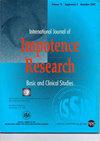Penile cancer treatment and sexuality: a narrative review
IF 2.5
3区 医学
Q2 UROLOGY & NEPHROLOGY
引用次数: 0
Abstract
Penile squamous cell carcinoma is a rare malignancy that poses a significant concern to those affected due to its aggressive nature and profound impact on patients’ quality of life. This review examines the evidence on the impact of penile cancer and its various treatments on the sexual health of patients. Men’s post-surgical sexual functioning has mainly been assessed with the International Index of Erectile Functioning. Some studies asked men to report retrospectively on pre-surgical sexual functioning or compared surgical techniques with non-randomized samples. Studies on patient’s perspectives on sexual sensations and appearance are emerging, however reliable assessments of sexual wellbeing are missing. Penile cancer significantly impacts patients’ sexual activity, sexual function, sexual sensations, cosmesis and sexual wellbeing. Considerable proportions of patients resume sexual activity following treatments, including organ-sparing procedures, partial or total penectomy, and adjuvant therapies. While organ-sparing surgeries can largely preserve sexual functioning, more invasive treatments like partial or total penectomy result in greater declines, with the impact on sexual wellbeing remaining underexplored. Rigorous prospective studies assessing valid and reliable patient reported outcome measures for sexual wellbeing besides sexual functioning are needed in order to fully understand and address the impact of penile cancer treatment on sexual health.阴茎癌治疗与性:一个叙事回顾。
阴茎鳞状细胞癌是一种罕见的恶性肿瘤,由于其侵袭性和对患者生活质量的深刻影响,引起了人们的极大关注。本文综述了有关阴茎癌及其各种治疗方法对患者性健康影响的证据。男性术后性功能主要通过国际勃起功能指数进行评估。一些研究要求男性回顾性报告术前性功能,或将手术技术与非随机样本进行比较。关于患者对性感觉和性外表的看法的研究正在兴起,然而对性健康的可靠评估却缺失。阴茎癌显著影响患者的性活动、性功能、性感觉、美容和性健康。相当比例的患者在治疗后恢复性活动,包括器官保留手术、部分或全部阴茎切除术和辅助治疗。虽然保留器官的手术可以在很大程度上保持性功能,但更多的侵入性治疗,如部分或全部阴茎切除术,会导致更大的下降,对性健康的影响仍未得到充分研究。为了充分了解和解决阴茎癌治疗对性健康的影响,需要进行严格的前瞻性研究,评估有效和可靠的患者报告的除性功能外的性健康结果措施。
本文章由计算机程序翻译,如有差异,请以英文原文为准。
求助全文
约1分钟内获得全文
求助全文
来源期刊

International Journal of Impotence Research
医学-泌尿学与肾脏学
CiteScore
4.90
自引率
19.20%
发文量
140
审稿时长
>12 weeks
期刊介绍:
International Journal of Impotence Research: The Journal of Sexual Medicine addresses sexual medicine for both genders as an interdisciplinary field. This includes basic science researchers, urologists, endocrinologists, cardiologists, family practitioners, gynecologists, internists, neurologists, psychiatrists, psychologists, radiologists and other health care clinicians.
 求助内容:
求助内容: 应助结果提醒方式:
应助结果提醒方式:


